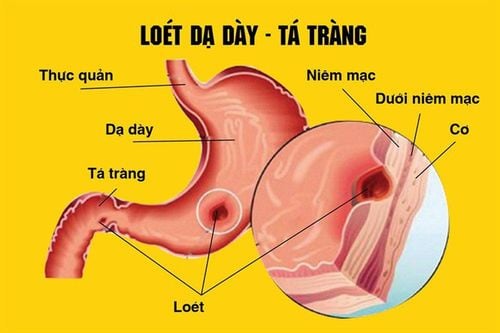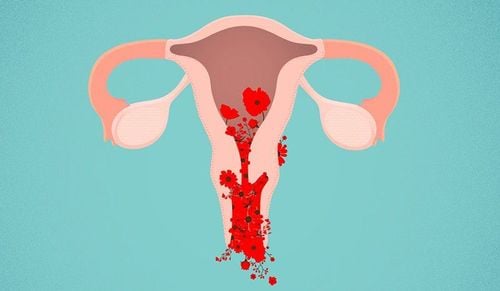Article by Dr. Mai Vien Phuong, MSc, MD - Gastroenterologist - Department of Examination & Internal Medicine - Vinmec Central Park International General Hospital
Vomiting blood is an uncommon condition but has many potential serious health problems. So what is the main cause of vomiting coffee grounds-like blood?
1. What is vomiting blood?
Vomiting blood, vomiting blood or hemoptysis is a condition in which stomach contents are regurgitated and escape through the esophagus, mixed with blood or only blood. This condition can be of concern if there is an internal injury causing rupture or internal bleeding. However, in some cases, the cause of vomiting blood is not due to a medical condition, such as trauma to the mouth or nose causing bleeding and accidentally swallowing blood back.
Vomiting blood can be brown (looks like coffee grounds), dark red, or bright red. The color and amount of blood can often tell your doctor the source and severity of the condition. If you vomit a large amount of blood (about 500ml) or are accompanied by other symptoms such as dizziness or changes in breathing, you need to seek medical attention immediately.
2. What is coffee grounds vomiting?
Coffee grounds vomiting is vomit that looks like coffee grounds. This occurs due to the presence of blood clots in the vomit.
The color of the vomit will vary depending on how long the blood has been in your gastrointestinal (GI) system. If you have delayed vomiting, the blood will be dark red, brown, or black. The presence of blood clots in the vomit will make it look like coffee grounds. This is a serious condition and requires immediate medical attention. Be sure to write down the time and amount you vomited and anything that may have caused the vomiting. If possible, you should bring a sample of the vomit to your doctor for further testing.

3. What symptoms can occur with vomit that looks like coffee grounds?
Get emergency medical care as soon as you start vomiting blood. Call 911 or your local emergency services immediately if you vomit blood or vomit that looks like coffee grounds and you are also experiencing:
- Unusually pale or ashen skin
- Fainting
- Dizziness
- Chest pain
- Bright red blood or large chunks in the vomit
- Severe abdominal pain
3.1 What causes vomit that looks like coffee grounds?
Vomits that look like coffee grounds, black blood, or dark blood can occur due to various conditions, including stomach ulcers, esophageal varices related to cirrhosis, or gastritis. If you have this symptom, see your doctor as soon as possible for a proper diagnosis.
Other possible causes of coffee-ground vomit include:
- Stomach and esophagus problems related to cirrhosis due to alcohol abuse, viral hepatitis, autoimmune diseases, or fatty liver disease
- Esophageal cancer, pancreas, or stomach
- Diseases such as Ebola virus infection, hemophilia B, or yellow fever
3.2 How is the cause of coffee-ground vomit diagnosed?
Coffee-ground vomit is often a sign of gastrointestinal bleeding. You should see your doctor for testing if you experience it. Your doctor will ask you about your symptoms, other health conditions, and medications you may be taking. After reviewing your medical history and performing a physical exam, your doctor will order one or more tests to determine the cause of the bleeding.
In addition to X-rays and basic blood tests, your doctor may perform the following tests:
- An occult blood test is a test your doctor may use to look for blood in your vomit.
- An upper GI endoscopy is a procedure in which your doctor inserts a small, flexible tube with a camera down your esophagus to view your internal organs.
- Liver function tests are blood tests that can help your doctor identify any disease or damage to your liver.
- A fecal occult blood test is a test that can detect blood in your stool.
During a flexible sigmoidoscopy or colonoscopy, your doctor inserts a small tube with a camera through your anus and into your colon and rectum. Your doctor will make a diagnosis based on these tests and begin a treatment plan to address the underlying condition.

4. What are the complications of vomiting blood that looks like coffee grounds?
Although cases of vomiting blood from the stomach are rare, they can still be life-threatening if not treated immediately. People at risk include:
- Elderly people
- People with a history of alcohol abuse
- People with a history of stroke
- People with a history of disorders that affect the ability to swallow
In addition, vomiting blood can also cause complications such as:
- Suffocation is one of the main complications of vomiting blood, which can lead to hemothorax, reducing the ability to breathe.
- Anemia can occur if the patient loses too much blood when vomiting quickly and suddenly.
- Shock. The patient may experience symptoms of shock such as dizziness when standing, rapid, shallow breathing, little urine, cold, and pale skin. This condition often leads to hypotension, coma, and death if not treated promptly.
5. Treating Coffee Ground Vomiting, Treating Gastrointestinal Bleeding
Treatment for coffee ground vomiting depends on the cause and location of your internal bleeding. There are many possible causes of gastrointestinal bleeding, and your doctor's first task will be to determine which one is causing yours.
Your doctor can usually determine the cause of your gastrointestinal bleeding with diagnostic tests and procedures. Often, treatment can be applied at the same time. For example, during an endoscopy, your doctor can stop the bleeding by cutting or clamping blood vessels or by injecting medication.
If the cause of your gastrointestinal bleeding is an ulcer, your doctor can surgically cut the wound during the endoscopy to control the bleeding. If polyps in your colon are causing the bleeding, your doctor can often remove them during the endoscopy.
Depending on how much blood you have lost and whether your gastrointestinal bleeding continues, your doctor may give you intravenous fluids or a blood transfusion. You may need to take medication on an ongoing basis to control GI bleeding. For example, your doctor may prescribe a protein pump inhibitor (PPI) to control a bleeding ulcer. A PPI is a type of medication that reduces stomach acid.
According to an article in the Merck Manual, GI bleeding stops spontaneously in about 80% of people. If your GI bleeding continues, or if your doctor cannot determine the cause, exploratory surgery may be necessary.
If surgery is recommended, your doctor will usually use a minimally invasive, low-risk procedure called laparoscopy. The surgeon will make several small cuts in your abdomen and insert a thin instrument called an endoscope to examine your internal organs and determine the cause of GI bleeding. You can usually go home the same day.

Coffee ground vomit is considered a medical emergency. If left untreated, severe cases can lead to shock or even death. Therefore, you should see a doctor as soon as possible for evaluation and treatment.
To find the specific cause of the patient's hematemesis, Vinmec International General Hospital will conduct an examination and perform specialized tests for diagnosis (Prepared gastroesophageal X-ray, abdominal ultrasound, X-ray, blood test...) If necessary, it can be combined with many different specialties to find the cause and have a safe treatment direction for the patient.
In order to provide the best quality and medical services to patients, the hospital has invested in infrastructure, modern equipment, and a team of leading doctors and experts, all of whom are qualified from many major hospitals across the country, who will directly participate in the examination and treatment process.
Please dial HOTLINE for more information or register for an appointment HERE. Download MyVinmec app to make appointments faster and to manage your bookings easily.
References
Ansari P. (2016). Overview of digestive bleeding. Merckmanuals.com/professional/gastrointestinal_disorders/gi_bleeding/overview_of_gi_bleeding.html Bou-Abdallah JZ, et al. (2012). Coffee grounds emesis: Not just an upper digest bleed. DOI: 10.1016/j.jemermed.2009.05.008 Diagnosis of digestive bleeding. (2016). Niddk.nih.gov/health-information/digestive-diseases/gastrointestinal-bleeding/diagnosis
procedures Digestive bleeding. (n.d.). my.clevelandclinic.org/health/diseases/17028-gi-bleeding Mayo Clinic Staff. (2018) Gastrointestinal bleeding. Mayoclinic.org/diseases-conditions/gastrointestinal-bleeding/diagnosis-treatment/drc-20372732 Mayo Clinic Staff. (2018). Vomiting blood. Mayoclinic.org/symptoms/vomiting-blood/basics/definition/sym-20050732














